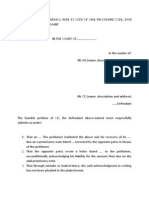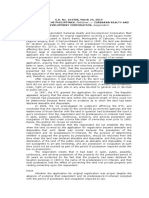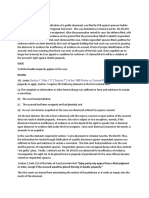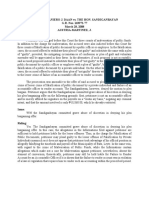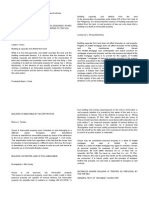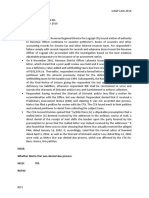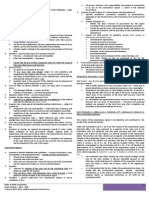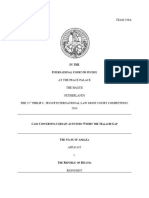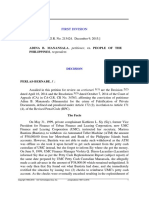Apiag V Cantero
Apiag V Cantero
Uploaded by
Argel Joseph CosmeCopyright:
Available Formats
Apiag V Cantero
Apiag V Cantero
Uploaded by
Argel Joseph CosmeOriginal Description:
Original Title
Copyright
Available Formats
Share this document
Did you find this document useful?
Is this content inappropriate?
Copyright:
Available Formats
Apiag V Cantero
Apiag V Cantero
Uploaded by
Argel Joseph CosmeCopyright:
Available Formats
THIRD DIVISION [A.M. No. MTJ-95-1070. February 12, 1997.
] MARIA APIAG, TERESITA CANTERO SECUROM and GLICERIO CANTERO, complainants, vs. JUDGE ESMERALDO G. CANTERO, respondent. T . Sabillo for complainants. SYLLABUS 1. ADMINISTRATIVE LAW; PUBLIC OFFICERS; MISCONDUCT IN OFFICE; CONSTRUED. Misconduct, as a ground for administrative action, has a specific meaning in law. "Misconduct in office has definite and well understood legal meaning. By uniform legal definition, it is a misconduct such as affects his performance of duties as an officer and not such only as affects his character as a private individual. In such cases, it has been said at all times, it is necessary to separate the character of a man from the character of an officer. . . It is settled that misconduct, misfeasance, or malfeasance warranting removal from office of an officer, must have direct relation to and be connected with the performance of official duties . . .' More specifically, in Buenaventura vs. Benedicto, an administrative proceeding against a judge of the court of first instance, the present Chief Justice defines misconduct as referring 'to a transgression of some established and definite rule of action, more particularly unlawful behavior or gross negligence by the public officer.' That is to abide by the authoritative doctrine as set forth in the leading case of In re Horilleno, a decision penned by Justice Malcolm, which requires that in order for serious misconduct to be shown, there must be 'reliable evidence showing that the judicial acts complained of were corrupt or inspired by an intention to violate the law or were in persistent disregard of well-known legal rules.'" Amosco vs. Magro, 73 SCRA 107, pp. 108-109, September 30, 1976; citing Lacson vs. Roque, 92 Phil. 456, (1953), Buenaventura vs. Benedicto, 38 SCRA 71, March 27, 1971, and In re Impeachment of Horilleno, 43 Phil. 212, (1922). 2. CIVIL LAW; FAMILY CODE; VOID MARRIAGE; REQUIRES A JUDICIAL DECLARATION OF SUCH FACT BEFORE ANY PARTY CAN REMARRY; NOT APPLICABLE IN CASE AT BAR. This Court ruled that "Filomena Abella's marriage with the respondent was void ab initio under Article 80 [4] of the New Civil Code, and no judicial decree is necessary to establish the invalidity of void marriages." (Odayat vs. Amante, 77 SCRA 338 341, June 2, 1977). Now, per current jurisprudence, "a marriage though void still needs . . . a judicial declaration of such fact" (Wiegel vs. Sempio-Diy, 143 SCRA 499, 501, August 19, 1986) before any party thereto "can marry again, otherwise, the second marriage will also be void." (Sempio-Diy, Alicia V., The Family Code of the Philippines, p. 46, 1988). This was expressly provided under Article 40 ("The absolute nullity of a previous marriage may be invoked for purposes of remarriage on the basis solely of a final judgment declaring such previous marriage void.") of the Family Code. However, the marriage of Judge Cantero to Nieves Ygay took place and all their children were born before the promulgation of Weigel vs. Sempio-Diy and before the effectivity of the Family Code. 3. ADMINISTRATIVE LAW; JUDGES; SHOULD MAINTAIN HIGH ETHICAL PRINCIPLES AND SENSE OF PROPRIETY. The absence of a finding of criminal liability on his part does not preclude this Court from finding him administratively liable for his indiscretion, which would have merited disciplinary action from this Court had death not intervened. In deciding this case, the Court emphasizes that "(t)he personal
behavior of a judge, not only upon the bench but also in his everyday life, should be above reproach and free from the appearance of impropriety. He should maintain high ethical principles and sense of propriety without which he cannot preserve the faith of the people in the judiciary, so indispensable in an orderly society. For the judicial office circumscribes the personal conduct of a judge and imposes a number of restrictions thereon, which he has to observe faithfully as the price he has to pay for accepting and occupying an exalted position in the administration of justice." [Agpalo, Ruben, Legal Ethics, p. 465, Fourth Edition, 1989] DECISION PANGANIBAN, J p: Judges ought to be more learned than witty, more reverend than plausible, and more advised than confident. Above all things, integrity is their portion and proper virtue. 1 The eminent Francis Bacon wrote the foregoing exhortation some 400 years ago. Today, it is still relevant and quotable. By the nature of their functions, judges are revered as models of integrity, wisdom, decorum, competence and propriety. Human as they are, however, magistrates do have their own weaknesses, frailties, mistakes and even indiscretions. In the case before us, respondent Judge Esmeraldo G. Cantero was charged administratively in the twilight of his government service, as a result of a failed love affair that happened some 46 years ago. After an otherwise unblemished record, he would have reached the compulsory retirement age of 70 years on August 8, 1997 had death not intervened a few months ago on September 26, 1996. Notwithstanding his death, this Court still resolved to rule on this case, as it may affect his retirement benefits. Antecedent Facts In a letter-complaint 2 dated November 10, 1993, Maria Apiag Cantero with her daughter Teresita A. Cantero Sacurom and son Glicerio A. Cantero charged the respondent, Judge Esmeraldo G. Cantero of the Municipal Circuit Trial Court of Pinamungajan-Aloquinsan, Cebu, with gross misconduct for allegedly having committed bigamy and falsification of public documents. After receipt of the respondent's Comment, the Court on February 5, 1996, referred this case 3 to Executive Judge Gualberto P. Delgado of the Regional Trial Court of Toledo City, Cebu for investigation, report and recommendation. The latter submitted his Report and Recommendation 4 dated July 26, 1996. Thereafter, the Court referred this case also to the Office of the Court Administrator 5 for evaluation, report and recommendation. According to the complainants: "Sometime in August 11, 1947, defendant (should be respondent) and plaintiff (should be complainant) Maria Apiag, joined together in holy matrimony in marriage after having lived together as husband and wife wherein they begot a daughter who was born on June 19, 1947, whom they named: Teresita A. Cantero; and then on October 29, 1953, Glicerio A. Cantero was born. Thereafter, defendant left the conjugal home without any apparent cause, and leaving the plaintiff Maria Apiag to raise the two children with her meager income as a public school teacher at Hinundayan, Southern Leyte. Plaintiffs suffered a lot after defendant abandoned them for no reason whatsoever. For several years, defendant was never heard of and his whereabout unknown. Few years ago, defendant surfaced at Hinundayan, Southern Leyte, whereupon, plaintiffs begged for support, however, they were ignored by defendant. . . ." 6
On September 21, 1993, complainants, through Atty. Redentor G. Guyala, wrote a letter to respondent as follows: "Judge Esmeraldo Cantero Pinamungajan, Cebu Dear Judge Cantero: We are writing in behalf of your legal wife, Maria Apiag, and your two legitimate children by her, Teresita (Mrs. Sacurom) and Glicerio. It appears that sometime in the 1950's for reasons known only to you, you left your conjugal home at Hinundayan, Southern Leyte, and abandoned without any means of support your said wife and children. Since then and up to now, they have not seen or heard from you. They would wish now that you do them right by living up to your duty as husband and father to them, particularly that expressly provided under Art. 68 and Art. 195 of the Family Code (Art. 109 and 195 of the Civil Code) in relation to Art. 203 of the same Code. You will please consider this letter as a formal demand for maintenance and support for three of them, and a request that they be properly instituted and named as your compulsory heirs and legal beneficiaries in all legal documents now on file and to be filed with the Supreme Court and other agencies or offices as may be required under applicable laws, such as, the insurance (GSIS) and retirement laws. We hope this matter can be amicably settled among you, your wife and children, without having to resort to judicial recourse. Very truly yours, (SGD.) REDENTOR G. GUYALA" 7 The letter elicited no action or response from the respondent. Subsequently, complainants learned that respondent Judge had another family. In their own words, ". . . The plaintiffs later on learned that defendant has another wife by the name of Nieves C. Ygay, a Public School teacher from Tagao, Pinamungajan, Cebu. According to some documents obtained by plaintiffs, the herein defendant and Nieves C. Ygay have children of their own, named as follows with their date of births: Noralyn Y. Cantero May 19, 1968; Ellen Y. Cantero February 4, 1970; Erwin Y. Cantero April 29, 1979; Onofre Y. Cantero June 10, 1977; and Desirie Vic Y. Cantero December 2, 1981. It was shocking to the senses that in all of the public documents required of defendant Judge Cantero to be filed with the Supreme Court such as his sworn statement of assets and liabilities, his personal data sheet (SC Form P. 001), income tax returns and his insurance policy with the Government Service Insurance System, defendant misrepresented himself as being married to Nieves C. Ygay, with whom he contracted a second marriage. The truth of the matter is that defendant is married to plaintiff Maria Apiag with whom they have two legitimate children, namely: Teresita A. Cantero and Glicerio A. Cantero." 8 The respondent Judge, in his Comment, explained his side as follows: ". . . I admit the existence and form of Annex 'A' of the said complaint, but vehemently deny the validity of its due execution, for the truth of the matter is that such alleged marriage was only dramatized at the instance of our parents just to shot (sic) their wishes and purposes on the matter, without my consent freely given. As a matter of fact, I was only called by my parents to go home to our town at Hinundayan, Southern Leyte to
attend party celebration of my sister's birthday from Iligan City, without patently knowing I was made to appear (in) a certain drama marriage and we were forced to acknowledge our signatures appearing in the duly prepared marriage contract(.) That was 46 years ago when I was yet 20 years of age, and at my second year high school days." 9 Furthermore, Judge Cantero related that: ". . . sometime in the year 1947, when both respondent and complainant, Maria Apiag were still in their early age and in their second year high school days, they were engaged in a lovely affair which resulted to the pregnancy of the said complainant, and then and there gave birth to a child, named Teresita Apiag, having (been) born out of wedlock on June 19, 1947, now Mrs. Teresita Sacurom, one of the complainants. That in order to save name and shame, parents of both the respondent and the complainant came to an agreement to allow the respondent, and the complainant (to) get married in the (sic) name, but not to live together as husband, wife for being close relatives, thereby forcing the respondent to appear in a marriage affair where all the pertinent marriage papers were all ready (sic) prepared (sic), and duly signed by somebody; that after the said affair both respondent and the complainant immediately separated each other (sic) without living together as husband, and wife even for a day, nor having established a conjugal home. From that time respondent and the complainant have never met each other nor having (sic) communicated (with) each other for the last 40 years; that respondent continued his studies at Cebu City, and eventually became member of the Philippine Bar, having passed the bar examination in the year 1960, that is 14 years after the affair of 1947; that in 1964, respondent was first connected in the government service as Comelec Registrar of the Commission on Elections, assigned at Pinamungajan, Cebu(,) that is 16 years after the affair of 1947; that in the year 1982, respondent was appointed as CLAO lawyer, now PAO, of the Department of Justice, that is 35 years after the after the affair of 1947; and finally, on October 3, 1989, respondent was appointed to the Judiciary as Municipal Circuit Trial Judge (MCTC) of the Municipalities of Pinamungajan and Aloguinsan, province of Cebu, that is 42 years from August 11, 1947; that respondent is (sic) already 32 years in the government service up to the present time with more than 6 years in the Judiciary; that respondent is already 69 years old, having been born on August 8, 1927, and retirable by next year if God willing; that respondent has served in the government service for the last 32 years, faithfully, honestly and judiciously without any complaint whatsoever, except this instant case; that respondent as member of the Judiciary, has liveup (sic) to the standard required by the (sic) member (sic) of the bar and judiciary; that the charges against the respondent were all based or rooted from the incedent (sic) that happened on August 11, 1947 and no other; that the complainants are morally dishonest in filing the instant (case) just now, an elapsed (sic) of almost 42 years and knowing that respondent (is) retirable by next year, 1997; that this actuation is very suspicious, and intriguing; xxx xxx xxx That complainant Maria Apiag has been living together with another man during her public service as public school teacher and have begotten a child, name (sic) Manuel Apiag and respondent promised (sic) the Honorable Court to furnish a complete paper regarding this case in order to enlighten the Honorable (Court) that, he who seek (sic) justice must seek justice with cleab (sic) hand;
That respondent did not file any annullment (sic) or judicial declaration (of nullity) of the alleged marriage because it is the contention and honest belief, all the way, that the said marriage was void from the beginning, and as such nothing is to be voided or nullified, and to do so will be inconsistent with the stand of the respondent; that this instant case (was) simply filed for money consideration as reflected in their letter of demand; (t)hat as a matter of fact, respondent and the complainant have already signed a compromised (sic) agreement, copy of which hereto (sic) attached as Annex '1', stating among other things that respondent will give a monthly allowance to Terecita (sic) Sacurom in the (amount) of P4,000.00 and the complainant will withdraw their complaint from the Supreme Court., and that respondent had already given the said allowance for three consecutive months plus the amount of P25,000.00 for their Attorney to withdraw the case, and that respondent stop (sic) the monthly allowance until such time the complainant will actually withdraw the instant case, and without knowledge of the respondent, complainant proceeded (sic) their complaint after the elapsed (sic) of three (3) years." 10 Relevant portions of said compromise agreement which was executed sometime in March 1994 by Esmeraldo C. Cantero and Teresita C. Sacurom and witnessed by Maria Apiag and Leovegardo Sacurom are reproduced thus: "That this COMPROMISE AGREEMENT is executed and entered into by ESMERALDO C. CANTERO, of legal age, married, Filipino, and with residence and postal address at Pinamungajan, Cebu, Philippines, otherwise called as the FIRST PARTY, and TERESITA C. SACUROM, also of legal age, married, Filipino, representing her mother and her brother, and a residence (sic) of 133-A J. Ramos Street, Caloocan City, after having duly swirn (sic) to in accordance with law do hereby depose and say: 1. That the First Party is presently a Municipal Circuit Trial Judge of PinamungajanAloguinsan, Cebu, is charged by Second Party for Misconduct before the Office of the Court Administrator of the Supreme Court now pending action; 2. That the parties have came (sic) to agreement to have the said case settled amicably in the interest of family unity and reconciliation, and arrived at compromise agreement based on law of equity, as follows: (a) That both parties have agreed voluntarily, the Second Party will get ONE FOURTH (1/4) of the retirement that the First will receive from the GSIS, and the rest of it will be for the First Party; cdt (b) That the Second Party and his brother will be included as one of the beneficiaries of the First Party, in case of death; (c) That the Second party and his only brother will inherit the properties of the First party inherited from his parents; (d) That the Second Party, representing her brother, is authorized to receive and collect P4,000.00, monthly out of the second check salary of the First Party (The second half salary only); 3. That it was further voluntarily agreed that the Second Party will cause the withdrawal and the outright dismissal of the said pending case filed by her and her mother; 4. That it was also agreed that the above agreement, shall never be effective and enforceable unless the said case will be withdrawn and dismiss (sic) from the Supreme Court, and said dismissal be received by the First Party, otherwise the above-agreement is
void from the beginning; and the Second Party must desist from further claining (sic) and filing civil abd (sic) criminal liabilities. 5. That this agreement is executed voluntarily, in good faith, and in the interest of good will and reconciliation and both parties is (sic) duty bound to follow faithfully and religiously." 11 In line with the foregoing, the respondent wrote a letter dated 14 March, 1994 addressed to the Government Service Insurance System (GSIS) designating Teresita Cantero Sacurom and Glicerio Cantero as additional beneficiaries in his life insurance policy. 12 The Issues The respondent Judge formulated the following "issues": "1. That the first marriage with the complainant, Maria Apiag on August 11, 1947 is void; 2. The absence of his first wife complainant Maria Apiag for more than seven (7) years raise the presumption that she is already dead, that there was no need for any judicial declaration; 3. The charge of Grave Misconduct is not applicable to him because assuming that he committed the offense, he was not yet a member of the judiciary; 4. The crime of Bigamy and Falsification had already prescribed; 5. The charges have no basis in fact and in law." 13 Report and Recommendation of Investigating Judge and Court Administrator Investigating Judge Gualberto P. Delgado recommended in his report that: "After a careful perusal of the evidence submitted by the parties, this Office finds respondent Guilty of the crime of Grave Misconduct (Bigamy and Falsification of Public Documents) however, considering his length of service in the government, it is recommended that he be suspended for one (1) year without pay." 14 The Office of the Court Administrator also submitted its report 15 recommending respondent Judge's dismissal, as follows: "After a careful review of all the documents on file in this case, we find no cogent reason to disturb the findings of the investigating judge. Extant from the records of the case and as admitted by respondent, he was married to complainant Maria Apiag on August 11, 1947 and have (sic) two (2) children with her. Respondent's contention that such marriage was in jest and assuming that it was valid, it has lost its validity on the ground that they never met again nor have communicated with each other for the last 40 years cannot be given a (sic) scant consideration. Respondent's argument that he was not yet a lawyer, much more, a member of the bench when he contracted his first marriage with the complainant, is unavailing for having studied law and had become a member of the Bar in 1960, he knows that the marriage cannot be dissolved without a judicial declaration of death. Respondent's second marriage with Nieves Ygay was therefore bigamous for it was contracted during the existence of a previous marriage. We are likewise not persuaded by the assertion of the respondent that he cannot be held liable for misconduct on the ground that he was not yet a lawyer nor a judge when the act(s) complained of were committed. The infraction he committed continued from the time he became a lawyer in 1960 to the time he was appointed as a judge in October 23, 1989. This is a continuing offense (an unlawful act performed continuously or over and
over again, Law Dictionary, Robert E. Rothenberg). He can therefore be held liable for his misdeeds. On the charge of falsification, it was shown with clarity in his Personal Data Sheet for Judges, Sworn Statement of Assets, Liabilities and Networth, Income Tax Return (pp. 99102, rollo), that he had committed a misrepresentation by stating therein that his spouse is Nieves Ygay and (had) eight (8) children (with her) which is far from (the) truth that his wife is Maria Apiag with whom he had two (2) children. Aside from the admission, the untenable line of defense by the respondent presupposes the imposition of an administrative sanction for the charges filed against him. 'A judge's actuation of cohabiting with another when his marriage was still valid and subsisting his wife having been allegedly absent for four years only constitutes gross immoral conduct' (Abadilla vs. Tabiliran Jr., 249 SCRA 447). It is evident that respondent failed to meet the standard of moral fitness for membership in the legal profession. While deceit employed by respondent, existed prior to his appointment as a . . . Judge, his immoral and illegal act of cohabiting with . . . began and continued when he was already in the judiciary. A judge, in order to promote public confidence in the integrity and impartiality of the judiciary, must behave with propriety at all times, in the performance of his judicial duties and in his everyday life. These are judicial guidepost to (sic) self-evident to be overlooked. No position exacts a greater demand on moral righteousness and uprightness of an individual than a seat in the judiciary (Atienza vs. Brilliantes, Jr., 243 SCRA 32-33). ACCORDINGLY, it is respectfully recommended that respondent judge be DISMISSED from the service with forfeiture of all leave and retirement benefits and with prejudice to re-appointment in any branch, instrumentality or agency of the government, including government-owned and controlled corporations." As earlier indicated, respondent Judge died on September 27, 1996 while this case was still being deliberated upon by this Court. The Court's Ruling In spite of his death, this Court decided to resolve this case on the merits, in view of the foregoing recommendation of the OCA which, if affirmed by this Court, would mean forfeiture of the death and retirement of the respondent. Gross Misconduct Not Applicable The misconduct imputed by the complainants against the judge comprises the following: abandonment of his first wife and children, failing to give support, marrying for the second time without having first obtained a judicial declaration of nullity of his first marriage, and falsification of public documents. Misconduct, as a ground for administrative action, has a specific meaning in law. "'Misconduct in office has definite and well understood legal meaning. By uniform legal definition, it is a misconduct such as affects his performance of his duties as an officer and not such only as affects his character as a private individual. In such cases, it has been said at all times, it is necessary to separate the character of man from the character of an officer. . . . It is settled that misconduct, misfeasance, or malfeasance warranting removal from office of an officer, must have direct relation to and be connected with the performance of official duties . . . .' More specifically, in Buenaventura vs. Benedicto, an administrative proceeding against a judge of the court of first instance, the present Chief Justice defines misconduct as referring 'to a transgression of some established and
definite rule of action, more particularly unlawful behavior or gross negligence by the public officer.' That is to abide by the authoritative doctrine as set forth in the leading case of In re Horilleno, a decision penned by Justice Malcolm, which requires that in order for serious misconduct to be shown, there must be 'reliable evidence showing that the judicial acts complained of were corrupt or inspired by an intention to violate the law or were in persistent disregard of well-known legal rules.'" 16 The acts imputed against respondent Judge Cantero clearly pertain to his personal life and have no direct relation to his judicial function. Neither do these misdeeds directly relate to the discharge of his official responsibilities. Therefore, said acts cannot be deemed misconduct much less gross misconduct in office. For any of the aforementioned acts of Judge Cantero" . . . (t)o warrant disciplinary action, the act of the judge must have a direct relation to the performance of his official duties. It is necessary to separate the character of the man from the character of the officer." 17 Nullity of Prior Marriage It is not disputed that respondent did not obtain a judicial declaration of nullity of his marriage to Maria Apiag prior to marrying Nieves C. Ygay. He argued however that the first marriage was void and that there was no need to have the same judicially declared void, pursuant to jurisprudence then prevailing. In the en banc case of Odayat vs. Amante, 18 complainant charged Amante, a clerk of court, with oppression, immorality and falsification of public document. The complainant Odayat alleged among others " . . . that respondent is cohabiting with one Beatriz Jornada, with whom he begot many children, even while his spouse Filomena Abella is still alive . . . ." In order to rebut the charge of immorality, Amante " . . . presented in evidence the certification (of the) . . . Local Civil Registrar . . . attesting that . . . Filomena Abella was married to one Eliseo Portales on February 16, 1948. Respondent's contention is that his marriage with Filomena Abella was void ab initio, because of her previous marriage with said Eliseo Portales." This Court ruled that "Filomena Abella's marriage with the respondent was void ab initio under Article 80 [4] of the New Civil Code, and no judicial decree is necessary to establish the invalidity of void marriages." 19 Now, per current jurisprudence, "a marriage though void still needs . . . a judicial declaration of such fact" 20 before any party thereto "can marry again; otherwise, the second marriage will also be void." 21 This was expressly provided under Article 40 22 of the Family Code. However, the marriage of Judge Cantero to Nieves Ygay took place and all their children were born before the promulgation of Wiegel vs. Sempio-Diy and before the effectivity of the Family Code. Hence, the doctrine in Odayat vs. Amante applies in favor of respondent. On the other hand, the charge of falsification will not prosper either because it is based on a finding of guilt in the bigamy charge. Since, as shown in the preceding discussion, the bigamy charge cannot stand, so too must the accusation of falsification fail. Furthermore, the respondent judge's belief in good faith that his first marriage was void shows his lack of malice in filling up these public documents, a valid defense in a charge of falsification of public document, 23 which must be appreciated in his favor. Personal Conduct of a Judge However, the absence of a finding of criminal liability on his part does not preclude this Court from finding him administratively liable for his indiscretion, which would have merited disciplinary action from this Court had death not intervened. In deciding this
case, the Court emphasizes that "(t)he personal behavior of a judge, not only upon the bench but also in his everyday life, should be above reproach and free from the appearance of impropriety. He should maintain high ethical principles and sense of propriety without which he cannot preserve the faith of the people in the judiciary, so indispensable in an orderly society. For the judicial office circumscribes the personal conduct of a judge and imposes a number of restrictions thereon, which he has to observe faithfully as the price he has to pay for accepting and occupying an exalted position in the administration of justice." 24 It is against this standard that we must gauge the public and private life of Judge Cantero. The conduct of the respondent judge in his personal life falls short of this standard because the record reveals he had two families. The record also shows that he did not attend to the needs, support and education of his children of his first marriage. Such is conduct unbecoming a trial magistrate. Thus, the late Judge Cantero "violated Canon 3 of the Canons of Judicial Ethics which mandates that '[a] judge's official conduct should be free from the appearance of impropriety, and his personal behavior, not only upon the bench and in the performance of judicial duties, but also in his everyday life, should be beyond reproach,' and Canon 2 of the Code of Judicial Conduct which provides that '[a] judge should avoid impropriety and the appearance of impropriety in all activities.'" 25 A Penalty of Suspension is Warranted Finally, the Court also scrutinized the whole of respondent's record. Other than this case, we found no trace of wrongdoing in the discharge of his judicial functions from the time of his appointment up to the filing of this administrative case, and has to all appearances lived up to the stringent standards embodied in the Code of Judicial Conduct. Considering his otherwise untarnished 32 years in government service, 26 this Court is inclined to treat him with leniency. Man is not perfect. At one time or another, he may commit a mistake. But we should not look only at his sin. We should also consider the man's sincerity in his repentance, his genuine effort at restitution and his eventual triumph in the reformation of his life. This respondent should not be judged solely and finally by what took place some 46 years ago. He may have committed an indiscretion in the past. But having repented for it, such youthful mistake should not forever haunt him and should not totally destroy his career and render inutile his otherwise unblemished record. Indeed, it should not demolish completely what he built in his public life since then. Much less should it absolutely deprive him and/or his heirs of the rewards and fruits of his long and dedicated service in government. For these reasons, dismissal from service as recommended by the Office of the Court Administrator would be too harsh. lexlib However, we also cannot just gloss over the fact that he was remiss in attending to the needs of his children of his first marriage children whose filiation he did not deny. He neglected them and refused to support them until they came up with this administrative charge. For such conduct, this Court would have imposed a penalty. But in view of his death prior to the promulgation of this Decision, dismissal of the case is now in order. WHEREFORE, premises considered, this case is hereby DISMISSED. SO ORDERED. Narvasa, C .J ., Davide, Jr., Melo and Francisco, JJ ., concur. Footnotes
1. Bacon, Francis (1561-1626), Essays: Of Judicature. See also Handbook for Judges, p. 276, The American Judicature Society, 1975. 2. Rollo, pp. 6-7. 3. Ibid., p. 21. 4. Ibid., pp. 138-143. 5. Ibid., p. 149. 6. Memorandum for Plaintiffs, pp. 2-3; Rollo, pp. 104-105. 7. Ibid, pp. 1-2; Rollo, pp. 103-104. 8. Ibid, pp. 2-3; Rollo, pp. 104-105 9. Comment for the Respondent, p. 1; Rollo, p. 13. 10. Memorandum for the Respondent, pp. 1-3; Rollo, pp. 52-54. 11. Rollo, p. 51. 12. Ibid, p. 115. 13. See Evaluation, Report, and Recommendation of the Office of the Court Administrator, p. 3; Rollo, p. 152. 14. Rollo, p. 143. 15. pp. 5-8; Rollo, pp. 154-156. 16. Amosco vs. Magro, 73 SCRA 107, pp. 108-109, September 30, 1976; citing Lacson vs. Roque, 92 Phil. 456 (1953), Buenaventura vs. Benedicto, 38 SCRA 71, March 27, 1971, and In re Impeachment of Horilleno, 43 Phil. 212 (1922). 17. Babatio vs. Tan, 157 SCRA 277, p. 280, January 22, 1988; citing Salcedo vs. Inting, 91 SCRA 19, June 29, 1979. 18. 77 SCRA 338, June 2, 1977. 19. Odayat vs. Amante, 77 SCRA 338, 341, June 2, 1977. 20. Wiegel vs. Sempio-Diy, 143 SCRA 499, 501, August 19, 1986. 21. Sempio-Diy, Alicia V., The Family Code of the Philippines, p. 46, 1988. 22. "The absolute nullity of a previous marriage may be invoked for purposes of remarriage on the basis solely of a final judgment declaring such previous marriage void." 23. Reyes, Luis B., Criminal Law, p. 211, Thirteenth Edition, 1993; citing People vs. Unico, et al., C.A., 56 O.G. 1681. 24. Agpalo, Ruben, Legal Ethics, p. 465, Fourth Edition, 1989; citing Canon 3, Canon of Judicial Ethics; Candia vs. Tagabucba, 79 SCRA 51, Sept. 12, 1977; Canon 1, Canons of Judicial Ethics; and Jugueta vs. Boncaros, 60 SCRA 27, Sept. 30, 1974. 25. Alfonso vs. Juanson, 228 SCRA 239, 254-255, December 7, 1993. 26. Except perhaps his occasional ungrammatical language and typographical errors.
You might also like
- Order 6 Rule 17 CPCDocument2 pagesOrder 6 Rule 17 CPCSimran Bagga100% (3)
- Cathay Pacific vs. CADocument1 pageCathay Pacific vs. CAMareca DomingoNo ratings yet
- 81 People vs. Dela Cruz PDFDocument22 pages81 People vs. Dela Cruz PDFKris Dela CruzNo ratings yet
- LTD Case Digest - 2Document3 pagesLTD Case Digest - 2Leslie EspinosaNo ratings yet
- Mejoff Vs Director of Prisons: FactsDocument10 pagesMejoff Vs Director of Prisons: FactsWindy Awe MalapitNo ratings yet
- G.R. No. L-31156Document15 pagesG.R. No. L-31156Henson MontalvoNo ratings yet
- 010 PNB v. Office of The President - ACUNA DoneDocument2 pages010 PNB v. Office of The President - ACUNA DoneVince Llamazares LupangoNo ratings yet
- Judith Yu vs. Judge Risa Samson-TatadDocument2 pagesJudith Yu vs. Judge Risa Samson-TatadAreeya ManalastasNo ratings yet
- People of The Philippines vs. Jimboy Suico (Full Text, Word Version)Document10 pagesPeople of The Philippines vs. Jimboy Suico (Full Text, Word Version)Emir MendozaNo ratings yet
- Planteras, Jr. vs. People (Full Text, Word Version)Document15 pagesPlanteras, Jr. vs. People (Full Text, Word Version)Emir MendozaNo ratings yet
- GR NO. 175888 Sombilon V. RomuloDocument9 pagesGR NO. 175888 Sombilon V. RomuloDat Doria PalerNo ratings yet
- 23 G.R. No. 164408 DigestDocument2 pages23 G.R. No. 164408 DigestRonnie Garcia Del RosarioNo ratings yet
- Facts:: Section 7, Rule 117 ("Section 7") of The 1985 Rules On Criminal ProcedureDocument1 pageFacts:: Section 7, Rule 117 ("Section 7") of The 1985 Rules On Criminal ProcedureLinalyn LeeNo ratings yet
- Case 8 PEOPLE Vs SIONDocument1 pageCase 8 PEOPLE Vs SIONapril rose ticarNo ratings yet
- Statutory References:: ART. 13. DefinitionsDocument16 pagesStatutory References:: ART. 13. DefinitionsTal MigallonNo ratings yet
- Labor Law 1 Digests 1Document6 pagesLabor Law 1 Digests 1Alyssa Denise A AverillaNo ratings yet
- Binay vs. SOJ-GR No. 170643, Sept. 8 2006Document8 pagesBinay vs. SOJ-GR No. 170643, Sept. 8 2006James OcampoNo ratings yet
- Samson Vs DawayDocument1 pageSamson Vs DawayJoshua Quentin TarceloNo ratings yet
- 14mateo de Ramas v. CARDocument4 pages14mateo de Ramas v. CARarbiemae87No ratings yet
- Notarial and Employment Purposes - Certificate of Bar Membership, Bar Ratings, Good Standing or No Pending CaseDocument3 pagesNotarial and Employment Purposes - Certificate of Bar Membership, Bar Ratings, Good Standing or No Pending CaseJen DioknoNo ratings yet
- Public International Law CasesDocument479 pagesPublic International Law CasesMaria Margaret MacasaetNo ratings yet
- CIVPRO Case DigestDocument3 pagesCIVPRO Case DigestBenedick LedesmaNo ratings yet
- Atong Paglaum vs. COMELECDocument326 pagesAtong Paglaum vs. COMELECDudly RiosNo ratings yet
- Labor DigestsDocument17 pagesLabor DigestsTricia GrafiloNo ratings yet
- Fortich V CoronaDocument2 pagesFortich V CoronaCarissa BonifacioNo ratings yet
- 05 - Santos III V Northwest Orient AirlinesDocument5 pages05 - Santos III V Northwest Orient AirlinesRogelio Rubellano IIINo ratings yet
- Article 7 CASES Sec.1-21Document114 pagesArticle 7 CASES Sec.1-21Regine LangrioNo ratings yet
- Allado vs. DioknoDocument8 pagesAllado vs. DioknoNoo NooooNo ratings yet
- Labor KinemeDocument3 pagesLabor KinemeMics SantosNo ratings yet
- David Vs ArroyoDocument4 pagesDavid Vs ArroyoRmLyn MclnaoNo ratings yet
- Pat Digests 002Document4 pagesPat Digests 002Michaela Anne CapiliNo ratings yet
- Labor 1 FinalsDocument37 pagesLabor 1 FinalsNorr MannNo ratings yet
- LGBT V ComelecDocument1 pageLGBT V ComelecLebron JamesNo ratings yet
- NESTLE v. Uniwide SalesDocument4 pagesNESTLE v. Uniwide SalesRam PagongNo ratings yet
- Cases WageDocument39 pagesCases WageMarivic Asilo Zacarias-LozanoNo ratings yet
- Bonifacio, Et - Al. v. RTC of Makati Branch 149Document11 pagesBonifacio, Et - Al. v. RTC of Makati Branch 149Neil SubacNo ratings yet
- THE PEOPLE OF THE PHILIPPINES, Petitioner, vs. JUAN P. ENRIQUEZ, Judge of The First Instance of Batangas, Second Branch, and FIDEL SALUD, JR., RespondentsDocument3 pagesTHE PEOPLE OF THE PHILIPPINES, Petitioner, vs. JUAN P. ENRIQUEZ, Judge of The First Instance of Batangas, Second Branch, and FIDEL SALUD, JR., RespondentsShaiNo ratings yet
- CIVPRO - CASES - Parties - Venue.uniformprocedure - Partsofpleadings. Aguas V Llemos To Vda de Hermoso V PNBDocument297 pagesCIVPRO - CASES - Parties - Venue.uniformprocedure - Partsofpleadings. Aguas V Llemos To Vda de Hermoso V PNBMark MlsNo ratings yet
- Answer To Direct Examination of Witness For The Prosecution Cassandra SorianoDocument3 pagesAnswer To Direct Examination of Witness For The Prosecution Cassandra SorianoReeva ViadoNo ratings yet
- Evangeline Alday vs. FGU Insurance Corp., G.R. No. 138822, January 23, 2001Document4 pagesEvangeline Alday vs. FGU Insurance Corp., G.R. No. 138822, January 23, 2001Lou Ann AncaoNo ratings yet
- Dela Paz V Senate DigestDocument2 pagesDela Paz V Senate DigestDonn LinNo ratings yet
- Precy Bunyi and Mila Bunyi V. Fe S. Factor: G.R. No. 172547 June 30, 2009Document3 pagesPrecy Bunyi and Mila Bunyi V. Fe S. Factor: G.R. No. 172547 June 30, 2009Gretchen Alunday SuarezNo ratings yet
- LaborDocument16 pagesLaborAlysa MaligayaNo ratings yet
- Consti 2 Digest 132 Govt of Usa Vs Judge PurgananDocument13 pagesConsti 2 Digest 132 Govt of Usa Vs Judge PurgananRed HoodNo ratings yet
- Minoru Fujiki Vs Maria Paz MarinayDocument3 pagesMinoru Fujiki Vs Maria Paz MarinayJNo ratings yet
- Lumanlaw Vs PeraltaDocument13 pagesLumanlaw Vs PeraltaJaimie Paz AngNo ratings yet
- TaycoDocument3 pagesTaycoRitch LibonNo ratings yet
- Duties To The CourtsDocument55 pagesDuties To The CourtshansNo ratings yet
- Reyes, Christian Emil B. - Week 10Document3 pagesReyes, Christian Emil B. - Week 10Christian Emil B. ReyesNo ratings yet
- David Vs ArroyoDocument5 pagesDavid Vs ArroyoPortia WynonaNo ratings yet
- People vs. EspanolaDocument30 pagesPeople vs. EspanolaRegine GumbocNo ratings yet
- Carino vs. CHRDocument3 pagesCarino vs. CHRCam'c Bristol100% (1)
- Biaco vs. PCRB 515 Scra 106Document13 pagesBiaco vs. PCRB 515 Scra 106albemartNo ratings yet
- PP v. YutilaDocument2 pagesPP v. Yutilacymon_argawanon6040No ratings yet
- Far East Bank and Trust Co vs. Court of Appeals 240 Scra 348Document5 pagesFar East Bank and Trust Co vs. Court of Appeals 240 Scra 348Marianne Shen PetillaNo ratings yet
- Garcia vs. Board of InvestmentsDocument2 pagesGarcia vs. Board of InvestmentsRochedale ColasiNo ratings yet
- PNB Vs National City Bank of New YorkDocument14 pagesPNB Vs National City Bank of New YorkEphraimEnriquez25% (4)
- Cosep Vs PeopleDocument2 pagesCosep Vs PeopleDael GerongNo ratings yet
- Apiag v. CanteroDocument5 pagesApiag v. Canterocmv mendozaNo ratings yet
- PFR - Finals - Apiag CaseDocument11 pagesPFR - Finals - Apiag CaseTIA BARTE FERRERNo ratings yet
- 13-Apiag v. Cantero, G.R. No. MTJ-95-1070Document6 pages13-Apiag v. Cantero, G.R. No. MTJ-95-1070Caddauan AccountNo ratings yet
- Jalandoni & Jamir For Defendant-Appellant. Samson S. Alcantara For Plaintiff-AppelleeDocument2 pagesJalandoni & Jamir For Defendant-Appellant. Samson S. Alcantara For Plaintiff-AppelleeArgel Joseph CosmeNo ratings yet
- Qeourt: L/.epublic of Tbe FlbtlippinegDocument13 pagesQeourt: L/.epublic of Tbe FlbtlippinegArgel Joseph CosmeNo ratings yet
- Cir V BF GoodrichDocument5 pagesCir V BF GoodrichArgel Joseph CosmeNo ratings yet
- People v. DumpoDocument1 pagePeople v. DumpoArgel Joseph CosmeNo ratings yet
- Ffiee: Ofthe in T TDocument1 pageFfiee: Ofthe in T TArgel Joseph CosmeNo ratings yet
- Guaranty DigestDocument11 pagesGuaranty DigestArgel Joseph CosmeNo ratings yet
- David V CADocument7 pagesDavid V CAArgel Joseph CosmeNo ratings yet
- Special Power of Attorney: HEREBY GIVING AND GRANTING, Unto My Said Attorney-In-FactDocument2 pagesSpecial Power of Attorney: HEREBY GIVING AND GRANTING, Unto My Said Attorney-In-FactArgel Joseph CosmeNo ratings yet
- Hagad V Gozo-DadoleDocument2 pagesHagad V Gozo-DadoleArgel Joseph Cosme100% (1)
- Producer Bank v. CADocument2 pagesProducer Bank v. CAArgel Joseph CosmeNo ratings yet
- Yaokasin V Customs DigestDocument2 pagesYaokasin V Customs DigestArgel Joseph CosmeNo ratings yet
- Eusebio V PeopleDocument7 pagesEusebio V PeopleArgel Joseph CosmeNo ratings yet
- Property EasementDocument13 pagesProperty EasementArgel Joseph CosmeNo ratings yet
- 189871Document14 pages189871Argel Joseph CosmeNo ratings yet
- Catholic Vicar Vs CADocument2 pagesCatholic Vicar Vs CAArgel Joseph CosmeNo ratings yet
- Evidence Cases On Opinion RuleDocument73 pagesEvidence Cases On Opinion RuleArgel Joseph CosmeNo ratings yet
- Corp Digests CompleteDocument212 pagesCorp Digests CompleteArgel Joseph CosmeNo ratings yet
- Property Possession and UsufructDocument19 pagesProperty Possession and UsufructArgel Joseph Cosme100% (3)
- Barayuga V Adventis UniversityDocument3 pagesBarayuga V Adventis UniversityanailabucaNo ratings yet
- Property Case DoctrinesDocument12 pagesProperty Case DoctrinesArgel Joseph CosmeNo ratings yet
- Certificates of Stocks and Transfer of Shares - Forest Hills V Vertex - (COSME)Document3 pagesCertificates of Stocks and Transfer of Shares - Forest Hills V Vertex - (COSME)Argel Joseph CosmeNo ratings yet
- Brandenburg DismissalDocument1 pageBrandenburg DismissalAroha MackayNo ratings yet
- PDF (Ebook PDF) Brownlie's Principles of Public International Law 9th Edition DownloadDocument41 pagesPDF (Ebook PDF) Brownlie's Principles of Public International Law 9th Edition Downloadranatazidar100% (2)
- IOI Canada - Ombudsman Bibliography - BooksDocument7 pagesIOI Canada - Ombudsman Bibliography - BooksashishNo ratings yet
- The Decisions Under Article 102 of The Constitution & Judicial ReviewDocument14 pagesThe Decisions Under Article 102 of The Constitution & Judicial ReviewAnu AmrinNo ratings yet
- 05 CIR v. Metro Star Superama Inc.Document2 pages05 CIR v. Metro Star Superama Inc.Rem SerranoNo ratings yet
- EXECUTIVE ORDER RCSP TEAM For BrgysDocument4 pagesEXECUTIVE ORDER RCSP TEAM For BrgysDILG DipaculaoNo ratings yet
- United States v. Jeffrey S. Burd, 86 F.3d 285, 2d Cir. (1996)Document5 pagesUnited States v. Jeffrey S. Burd, 86 F.3d 285, 2d Cir. (1996)Scribd Government DocsNo ratings yet
- Pub Corp NotesDocument45 pagesPub Corp NotesSherine Lagmay RivadNo ratings yet
- Rule: Administrative Process For Seizures and Forfeitures: Immigration and Nationality Act and Other AuthoritiesDocument3 pagesRule: Administrative Process For Seizures and Forfeitures: Immigration and Nationality Act and Other AuthoritiesJustia.comNo ratings yet
- Understanding Affirmative Action - Politics, Discrimination, and The Search For Justice (PDFDrive)Document199 pagesUnderstanding Affirmative Action - Politics, Discrimination, and The Search For Justice (PDFDrive)Ahmed saifNo ratings yet
- Persons and Family Relations: Atty. Mila Catabay LauiganDocument61 pagesPersons and Family Relations: Atty. Mila Catabay LauiganNorbert DiazNo ratings yet
- Itb-Janitorial and Clerical Manpower ServicesDocument2 pagesItb-Janitorial and Clerical Manpower ServicesPatrickNo ratings yet
- The ICFAI University, DehradunDocument13 pagesThe ICFAI University, DehradunSaurabh KumarNo ratings yet
- Constitution WebquestDocument7 pagesConstitution WebquestYasho BorusinskiNo ratings yet
- Rajeev Dhawan Vs ShanmugamDocument15 pagesRajeev Dhawan Vs ShanmugamKaranKr100% (1)
- Walsh v. Braunstein, 344 F.3d 126, 1st Cir. (2003)Document10 pagesWalsh v. Braunstein, 344 F.3d 126, 1st Cir. (2003)Scribd Government DocsNo ratings yet
- 141 Northern Motors vs. HerreraDocument2 pages141 Northern Motors vs. Herrerak santosNo ratings yet
- Tesla v. JohnsonDocument6 pagesTesla v. JohnsonDoctor ConspiracyNo ratings yet
- Abalos V Macatangay Digest 1Document3 pagesAbalos V Macatangay Digest 1Onireblabas Yor OsicranNo ratings yet
- Civ Pro Syllabus 2023Document11 pagesCiv Pro Syllabus 2023PCPL DABODABO,WB DELTACOYNo ratings yet
- Jessup Memo - 2014 - ADocument71 pagesJessup Memo - 2014 - ASrijeshNo ratings yet
- Exhibit 1Document12 pagesExhibit 1Humber & South Yorks Advisory CommitteeNo ratings yet
- Supreme Court: Gamboa and Gamboa For Petitioner. Office of The Solicitor General For RespondentDocument40 pagesSupreme Court: Gamboa and Gamboa For Petitioner. Office of The Solicitor General For RespondentMaria RumusudNo ratings yet
- CrimPro DigestDocument2 pagesCrimPro DigestMel Loise DelmoroNo ratings yet
- Tumalad v. VicencioDocument7 pagesTumalad v. Vicenciokaleidoscope worldNo ratings yet
- 01 Manansala vs. PeopleDocument11 pages01 Manansala vs. PeoplelexjuraNo ratings yet
- Republic Act No. 9165Document4 pagesRepublic Act No. 9165Vince Diza SaguidNo ratings yet
- IN RE - Letter of Reynato Puno - DigestDocument8 pagesIN RE - Letter of Reynato Puno - DigestMary Fatima BerongoyNo ratings yet
- 2011 CLC 1040Document5 pages2011 CLC 1040Haseebat MirzaNo ratings yet
